Demon Poetry. Mikhail Yurjevich Lermontov
Chase away the fog;
What is the poet's life without suffering?
And what is the ocean without a storm?
M.Yu. Lermontov
Great-grandfather of the great poet was a Scottish nobleman named George Lermont. He served the Poles, and in 1613 he was captured by Russian soldiers during the siege of Belaya fortress. The mercenary never returned to his homeland, preferring service in Russia. As a reward in 1621 in the Kostroma province, he was granted an estate. Lermontov's father, Yury Petrovich, was a military man, and having retired with the rank of infantry captain, he married Maria Mikhailovna Arsenyeva, who was descended from an “old noble family”. After the wedding, the newlyweds settled in the Penza province in Arsenyev estate called Tarkhany. However, Maria Mikhailovna, who was not in good health, went to Moscow, where medical aid was more developed. It was in the capital on the night from 14 to 15 in October 1814 in the midst of the storm that raged over the city, a boy was born "with painful leg and arm shapes". Maria Lermontova survived the birth hard, causing fear and the condition of the baby, named after his grandfather Michael.
Only by the end of December, Maria Mikhailovna finally recovered and returned home with her son. No matter how happy the appearance of the newborn grandmother Elizaveta Alekseevna and the father of the baby, and the hostility between them has not diminished. From the very beginning, Maria Mikhailovna’s mother was categorically against her daughter’s marriage with the “poor noblewoman.” However, Masha chose with her heart, according to the remaining information, the retired captain Lermontov was a rare handsome man with refined manners. After the wedding of her daughter, Elizaveta Alekseevna did not allow the newlyweds to dispose of the inheritance. Lermontov's position was “accustomed”, but the hardest thing was Maria Mihailovna, who was caught between two fires. The break in the relationship of spouses occurred when the mother of the poet learned about Yury Petrovich’s infidelities. Soon after, she fell ill: first mentally, and then physically. In February, 1817 was gone. Before her death, Maria Mikhailovna forgave her husband and begged her mother not to break off relations with him. In the spring of 1818, the father requested the child to come. The grandmother at the thought of losing his grandson was panicked, and she made a will, under which she promised Misha a legacy only if he lived with her for up to sixteen years. Yuri Petrovich, realizing that he could not provide a good future for the child, gave up.
Michael grew up a sickly child - because of the scrofula, his entire body was constantly covered with wet scabs and a rash. She was taken care of by Lermontov's well-behaved old nurse, Christina Roemer. With its help, the boy perfectly mastered the language of Schiller and Goethe, and Jean Cape, a Napoleon Guardsman, who remained after 1812 in Russia, taught him French. The tutor also taught him his first riding and fencing lessons. Often Afanasy Stolypin came to Tarkhany (Arsenyeva's younger brother) and told the boy about the Patriotic War, in which he participated. The mobile and lively mind of Lermontov received a lot of new impressions during his trips to the Caucasus to Arsenyev’s relatives. Elizaveta Alekseevna drove him there three times. Salubrious climate and sulfur baths really helped the child - scrofula retreated. Michel himself was fascinated by the freedom-loving world of local peoples. Upon arrival home, he sculpted figures of the Circassians, and also for the game "in the Caucasus" he made himself a small amusing army out of the peasant boys. Lermontov did not feel a lack of comrades, by the way - Arsenyeva called his peers from among relatives, as well as children of neighboring landowners suitable for them, to live in Tarkhany. The maintenance of this restless gang cost the grandmother every year ten thousand rubles. Children not only misbehaving, but also received primary education. Michael, in particular, showed a talent for drawing and modeling from colored wax.
In the summer of 1827, Lermontov visited the estate of his father, and in the fall, Arsenieva took him to study in Moscow. Her choice fell on the Moscow noble guesthouse, renowned for its benevolent atmosphere and its educators, striving to develop the natural talents of the students. Alexander Zinoviev, a teacher of the Latin and Russian languages, undertook to prepare the boy for admission. In all likelihood, he thoroughly pulled Lermontov - Mikhail passed the exams immediately to the fourth grade (there were six in total). In the fall of 1828, a teenager began his studies at a boarding house. True, the conditions of his studies were special - the grandmother, still not wanting to part with him, knocked the administration’s permission to take her grandson home in the evenings. However, at home Lermontov continued to study science. Incredibly capricious and purposeful, he wanted to become the first student in the class. At his request, Arsenyev hired an Englishman tutor, and soon Mikhail read Byron and Shakespeare in the original. And the boy drew it in such a way that the artist who was engaged in painting with him was amazed by his hands just in amazement. However, poetry became a true passion of Lermontov. It was in 1828 that for the first time he "began to dirty verses." The world saw the poem "Circassians", then "Prisoner of the Caucasus", "Caucasus", "Prayer", "Corsair" and the first version of "The Demon". But Lermontov was in no hurry to show, let alone publish his works. Even his teachers, the famous poets Alexei Merzlyakov and Semyon Raich in those years, did not see the works, under whose supervision Mikhail comprehended the basics of literary skill and the theory of versification.
Abilities to arts and diligence Lermontov quickly identified him from a number of other boarders. Michael's paintings were recognized as the best in 1829 during the arts exams. He enthusiastically played the piano and violin, remarkably recited, loved and knew how to dance. In the pension, Michel was surrounded by a rather free-loving atmosphere. Older pupils, for example, didn’t express themselves, not expressing their sympathy to the Decembrists. It was for this “spirit that is detrimental to the fragile minds” that the king disliked the guesthouse and in March 1830 decided to personally visit the “school of debauchery”. During the imperial visit, a curiosity happened - the students did not recognize his majesty, and there were no teachers nearby, as the imperial person came to visit without warning. When one of the boarders finally saw the tsar in Nikolai Pavlovich and greeted him in all his form, the comrades shouted him - how bold it is to greet the general as emperor. Nicholas I was furious and soon the privileged boarding school was demoted to a regular gymnasium.
Most of the boarders, and among them Lermontov, have decided to “resign” from the school. Still, Mikhail left the senior class, having achieved his goal - in public tests in the spring of 1830 for his academic achievements he was awarded the first prize. The memoirist Yekaterina Sushkova who knew him remarked in her memoirs: “It was gratifying to watch him triumphant ... His thought from his youth that he was not folded, bad, not of noble origin ... He confessed to me more than once how he would like to get into people and no one should be in this. " By the way, the poet got acquainted with Sushkova in the winter of 1830, and already in the summer, resting in Serednikovo with her relatives, he fell head over heels in love with the “black-eyed” girl. However, the eighteen-year-old Catherine only laughed at the clumsy fifteen-year-old boyfriend.
The sixteenth birthday of her grandson, Elizaveta Alekseevna, waited with anxiety, fearing that Yuri Petrovich, who had again declared his intention to reunite with her son, would be able to take over. Misha also wanted to leave with his father, but at the last moment, seeing the suffering and tears of his grandmother, he did not do this. On this multi-year family drama ended, leaving indelible scars on the hearts of all participants. At the end of the summer 1830 Lermontov passed the exams at Moscow University. At first he chose the moral-political department, but soon he realized that the verbal faculty was more in tune with his inner aspirations, and switched to it. However, before this young man, like all Muscovites, survived the cholera epidemic, which began in September 1830. The poet's fellow student, writer Peter Wistenhof, recalled: “All offices and educational institutions were closed, trade stopped, public amusements were banned. Moscow was cordoned off by a military cordon and quarantined. Those who had time, fled from the city ... The rest were locked in houses ... ”. Elizaveta Alekseevna chose not to get off her familiar place, relying on the fact that the observance of sanitary measures would help avoid contagion. The floors in the house were washed several times a day and always with bleach, all fruits and greens were excluded from the food, and it was allowed to leave the yard only in case of an urgent need and with a personal permission from Arsenyeva. Once in isolation, Mikhail began composing the romantic drama People and Passions, based on the conflict between father and grandmother.
In winter, the cholera epidemic receded, and the city returned to its usual life. The university resumed classes, and Lermontov plunged into the study of science. However, very soon he was surprised to find that the level of training of teachers leaves much to be desired. The poet began to skip classes, studying independently at home. And very soon, most of the teachers surpassed their knowledge. It is known that once he entered into an argument with the teacher of elegant literature Peter Pobedonostsev (by the way, the father of the famous Ober-Prosecutor of the Synod). According to the memoirs of the same Wistenhof, the learned husband’s brisk answer was interrupted by the words: “I did not read this to you and would like you to answer me exactly what I gave”. The answer discouraged him: “This, Mr. Professor, is true. What I said now you didn’t read to us and couldn’t give, because this is new and has not reached you yet. I use sources from my own modern library equipped with everything. ” Similar stories occurred at lectures on numismatics and heraldry.
During these years, Lermontov began to appear in the light, he could be seen at balls, masquerades, in theaters. The former timid young man gradually faded into the past - henceforth the poet knew how to impress the social lionesses. The recipient of the love lyrics of Mikhail Yuryevich in 1830-1831 was a certain Natalia - the daughter of playwright Fyodor Ivanov. Unfortunately, she did not share his feelings, but news about her marriage and completely plunged the poet into despondency. In the fall, the young man met Varenka, the younger sister of his good friends the Lopukhins. Pretty soon, Lermontov's passionate love for Varya was no longer a secret to others. This time, Mikhail Yuryevich was granted reciprocal sympathy, but he was not in a hurry to declare himself as a potential bridegroom.
In winter, the poet learned about the death of his father. In the last testament letter, Yury Petrovich instructed him: “Although you are still young, I see that he is gifted with mental abilities. Do not neglect them and most of all be afraid to use them for something useless or harmful - this is a talent in which you will once be obliged to give a report to God ... ”. Lermontov remembered his father's request in the spring of 1832, wanting to get a better education, filed a petition for transfer to the St. Petersburg Imperial University. The administration of Moscow University without delay has prepared all the papers, happily getting rid of too clever student.
The poet didn’t get along with the northern capital at once - the puffy desire for luxury hurt his eyes, forcing me to sadly recall the simple Moscow. Perhaps the first impressions would have been different, the poet’s idea with the translation would not have failed - the university management refused to count Mikhail Yuryevich on the courses he had attended earlier and offered to start training from scratch. After consulting with Elizabeth Alekseevna, Lermontov decided to try to show his talents in the military arena. Before his eyes, Arsenyeva had brilliant examples of his brothers: Alexander Stolypin, a former biographer and adjutant of Suvorov himself, as well as combat generals Dmitry and Nikolai. Mikhail Yuryevich wrote Lopukhina: “Until now, I lived for a literary career ... and now from now on I am a warrior. Maybe this is the special will of Providence ... to die with a bullet in the chest is no worse than from the slow agony of old age. ”
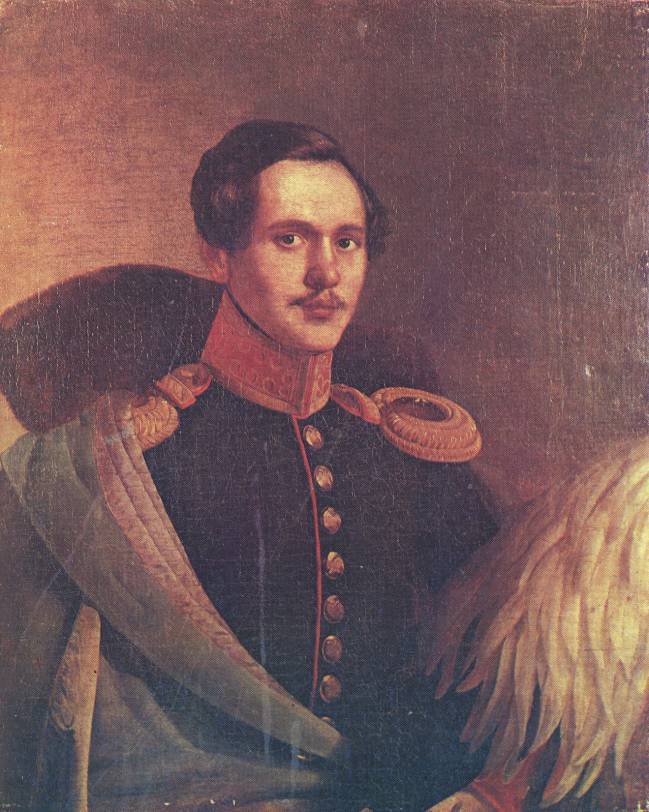
M. Yu. Lermontov in the uniform of the Life Guards Hussar Regiment. Portrait of P. Z. Zakharov-Chechen
In November, 1832 Lermontov as a volunteer enrolled in the Hussars Life Guards Regiment, and soon there was a misfortune with him. Driven by his senior comrades, the poet sat on an unbroken mare. His horse began to run between the others, and one kicked the rider into his right leg, breaking it. The treatment lasted for several months, but the leg had grown together incorrectly, which was strongly striking afterwards. Despite this, in April 1833 the poet easily passed the exams at the Cavalry Junkers School and the Guards Undersigns. Meanwhile, Lermontov's grandmother took a house near the School of Junkers on Moika and almost every day sent her grandson "smuggling" in the form of various delicacies. Arsenyeva had the hardest time in the summer, when all the junkers were sent to the cadet camp. Mikhail Yuryevich himself bivouac life demolished patiently, sharing her comrades with him. Especially close in those years, he became acquainted with the future writer Vasily Vonlyarlyarsky and his cousin Alex Stolypin, nicknamed "Mongo". Having escaped from under the tutelage of the grandmother — the junkers were allowed to go home only on Sundays and holidays — the poet plunged into a wild life, often becoming the initiator of various pranks. As a joke, Mikhail Yuryevich called himself "Maeshka" - in honor of the character of French caricatures, the hunchbacked freak, the vulgar and rogues. The frivolous Lermontov works “Ode to the Shelter,” “To Tizengausen,” “Ulansh,” “Goshpital,” “Peterhof Holiday,” revered by officers and cadets as truly hussar things, make intelligent literary scholars to this day blush.
In December, the poet 1834 again met the "black-eyed" Ekaterina Sushkova. However, this time the “executioner” and the “victim” changed places. Lermontov, falling in love with a girl, upset her wedding with Alexei Lopukhin, and then, having compromised in the eyes of the world, he threw it away. In one of the letters, the poet explained this by saying that he “repaid for the tears that coquetry m-lle S made to shed five years ago.” The intrigue had a different background, Lermontov tried at all costs to protect his comrade from Sushkova, calling her "a bat, whose wings are hooked on all the oncoming." However, revenge did not pass for the poet without a trace. Varenka Lopukhina, misinterpreting the relationship between Lermontov and Sushkova, in the winter of 1835 in despair responded by agreeing to the rich landowner Nikolai Bakhmetyev who had long been wooing to her. The news of the marriage of Wari plunged the writer into shock. Even the literary debut did not console him - “Haji Abrek” was published in the popular magazine “Library for Reading”. It should be noted that the manuscript in secret from the author was referred to the editor by a distant relative of Lermontov, Nikolai Yuriev. Mikhail Yuryevich, having learned about the publication, instead of gratitude, “was raging for almost an hour”. Varya Lopukhina remained the love of all life and the main muse of the great poet. Lermontov made it the prototype of the Faith from the “Hero of Our Time”, “Princess of Lithuania” and “Two Brothers”, dedicated many poems and poems. Three watercolor portraits of Vari by Mikhail Yuryevich have been preserved. By the way, Bakhmetev was jealous of his wife for the poet all the years of his marriage, forcing her to destroy all his correspondence with him. Varya survived Lermontov only by ten years, having died at the age of thirty-six.
In November, 1834 Lermontov became the cornet of the Life Guards Hussar Regiment. Army exercises and summer campaigns were replaced by dashing hacks in Tsarskoe Selo and winter ball seasons in St. Petersburg. Mikhail Yuryevich lived, thanks to his grandmother’s stately salary, on a grand scale. Being an ardent horseman, he did not spare any money for the horses. For example, it is known that in the spring of 1836 for 1580 rubles (a huge amount in those days), the writer bought a horse from one general.
In late January, 1837 Lermontov fell ill and was sent home for treatment. There he learned the news about Pushkin's duel. The very next day, shocked Mikhail Yuryevich composed the first part of the poem “The Death of a Poet”, and his friend Svyatoslav Raevsky made a number of copies. The work quickly spread among the youth, and their author, who formulated the general mood very precisely, immediately hit the target of the chief gendarme of the country, Benkendorf. By the way, initially Alexander Khristoforovich, who was a stranger with the Stolypin, reacted condescendingly to impudent lines. But soon Mikhail Yuryevich finished sixteen more lines beginning “And you, arrogant descendants ...”. There was already a “smell” not by the simple arrogance of the young man, but by the ringing slap in the face of secular society, “an appeal to revolution”. In mid-February, the poet was taken into custody.
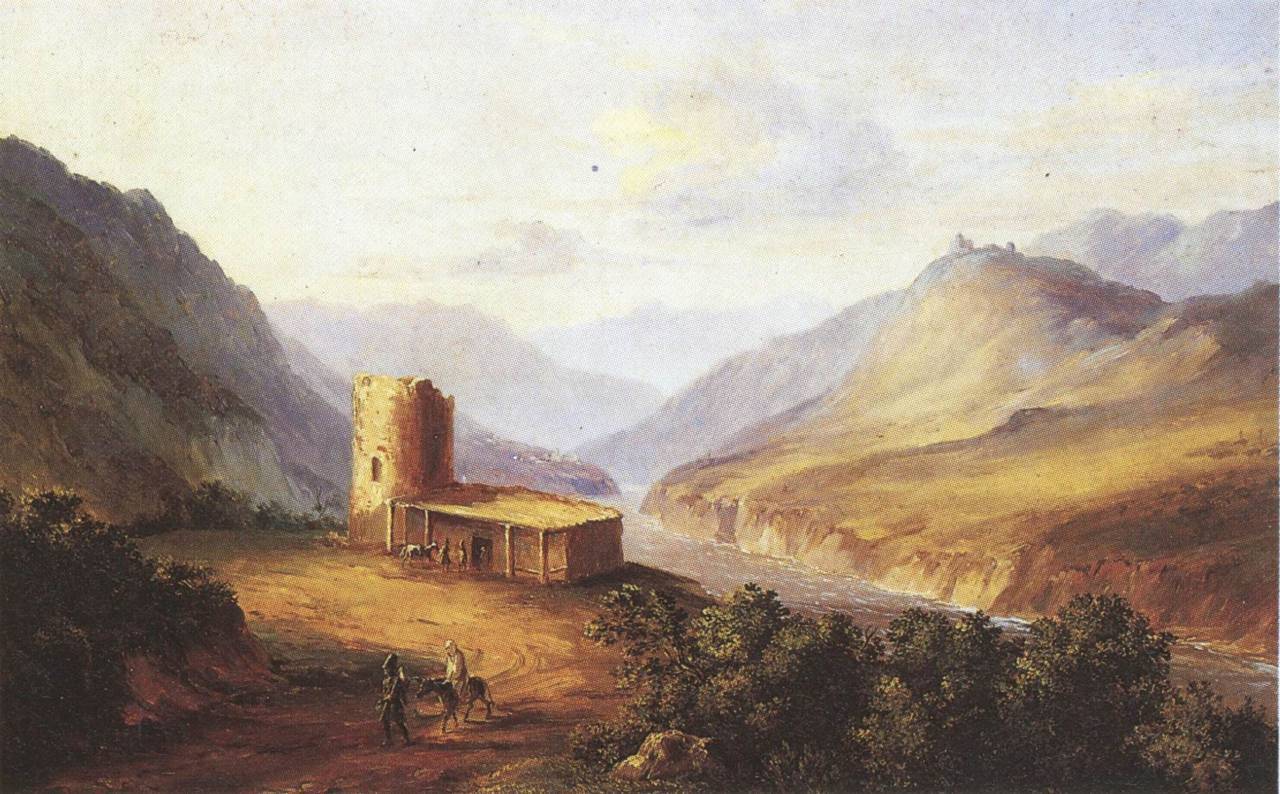
Georgian Military Road near Mtskheta (Caucasian view from the sacley). 1837. Painting M. Yu. Lermontov. Oil on cardboard
Under arrest, Lermontov worked enthusiastically. His relative recalled: "Michel ordered to wrap bread in paper and on these scraps with the help of a match, oven soot and wine, he wrote several new plays." By the way, in order to compose, Lermontov never needed any special external conditions. With equal ease he could write in his office, sitting in a carriage or in a tavern. Literary historian Pavel Viskovatii testified: “Everywhere he threw scraps of poems and thoughts, entrusting to the paper every movement of the soul .... He used every piece of paper that came across, and much was irretrievably lost ... He jokingly said to his man: “Pick up, pick up, over time they will pay big money, you will become rich”. When the paper under the hand did not happen, Lermontov wrote on the cover of books, at the bottom of a wooden box, on the tables, wherever he went. ”
Arseniev, to save his beloved grandson, raised all his influential relatives to his feet. An important role was played by the fact that Mikhail Yuryevich “repented” of his “delusion”. In late February, it became known that the emperor gave permission to discharge the poet in the same rank in the Nizhny Novgorod Dragoon Regiment, stationed in Georgia. In March, 1837 Lermontov left St. Petersburg, and in May arrived in Stavropol, where he was warmly received by his mother’s relative, General Pavel Petrov, who was chief of staff. The first thing the writer organized a trip around the neighborhood. On the left bank of the Terek, he drove to Kizlyar, but then due to fever he was forced to turn back. Stavropol doctor sent an officer for treatment in Pyatigorsk. Having recovered, Mikhail Yuryevich began to visit the local "water" society. He did this not only for the sake of entertainment, the idea of a new work matured in his head.
In August, Lermontov was instructed to arrive in Anapa. Out of curiosity, the poet drove into one "vile seaside town" on the way there. There, obviously, the story described in “Taman” happened to him. Mikhail Yuryevich hid all the details of returning to Stavropol without traveling things and money, stingyly stating that he was robbed on the way. At the same time, Benkendorf, pushed by the pleas of the “venerable old woman” Arsenyeva, succeeded in transferring the poet to the Grodno Hussars. In early January, 1838 Mikhail Yuryevich arrived in Moscow, and two weeks later he appeared in the northern capital. In a letter to a friend, he said: “All those whom I pursued in verse now shower me with flattery ... Pretty women seek me poetry and praise them with triumph ... There was a time when I looked for access to this society, but now Little by little I start to find it all intolerable. ” In late February, Lermontov arrived in Novgorod at a new place of service, but did not stay there for a long time. Through the efforts of Benkendorf, he returned to the Life Guards Hussar Regiment.
In mid-May, Mikhail Yuryevich was in Tsarskoye Selo. At the same time there was his last meeting with Vary Bakhmeteva. Unfortunately, none of them left memories of this meeting, but since then, more and more often the poet has become overpowered. In Tsarskoye Selo, Lermontov finally realized that the suit of salon red tape had become too small for him and no social entertainment was able to save him from boredom. What the writer really cared about was creativity. To the joy of the poet, "Tambov Treasurer" was approved by Vyazemsky and Zhukovsky. This gave him confidence, and in August, Mikhail Yuryevich first appeared in the cabin of Yekaterina Karamzina, one of the centers of St. Petersburg literary beau monde of those years. In literary living rooms it was customary to read their works, but Lermontov followed this tradition reluctantly and rarely. One of his friends wrote: “He didn’t have an excessive pride of authorship, he didn’t trust himself and willingly listened to the critical remarks of those people in whose friendship he was sure ... He wasn’t encouraged by selfish calculations, making a strict choice to the works that were determined to be printed” . At the same time, another of his comrades noted: “When he was alone or with those he loved, he became pensive, his face took a serious, unusually expressive, slightly sad expression, but as soon as one of the guards appeared, he immediately returned to his feigned gaiety, as if striving to push forward the void of secular Petersburg life, which he deeply despised. ” It should be noted that Lermontov had amazing insight. Philosopher Yury Samarin wrote: “You did not even have time to talk to him, but he already saw through you ... He never listens to what you say to him, he listens to you and observes ...”.
In 1839, the star of the journal Notes of the Fatherland has risen on the Russian literary horizon. Virtually every issue printed works by Mikhail Yuryevich, and the poet himself continued to combine the service of the sovereign with the service of the Muses. He lived in Tsarskoye Selo together with Stolypin-Mongo, and their "hussar officers gathered most of all." In December, 1839 Lermontov was promoted to lieutenant, and in mid-February, 1840 held his first duel. The enemy was the son of the French ambassador de Barant, and the cause was the young princess Maria Shcherbatova, who became interested in Mikhail Yuryevich. Shcherbatova responded to him in return, and Ernest de Barant, dragged behind the princess, could not stand it, demanded satisfaction in accordance with the rules of honor. According to another version, an old verse, The Poet's Death, provoked a quarrel. A few days before the challenge to the duel, Father de Baranta found out who Lermontov was in defiance of him: one Dantes or the entire French nation.
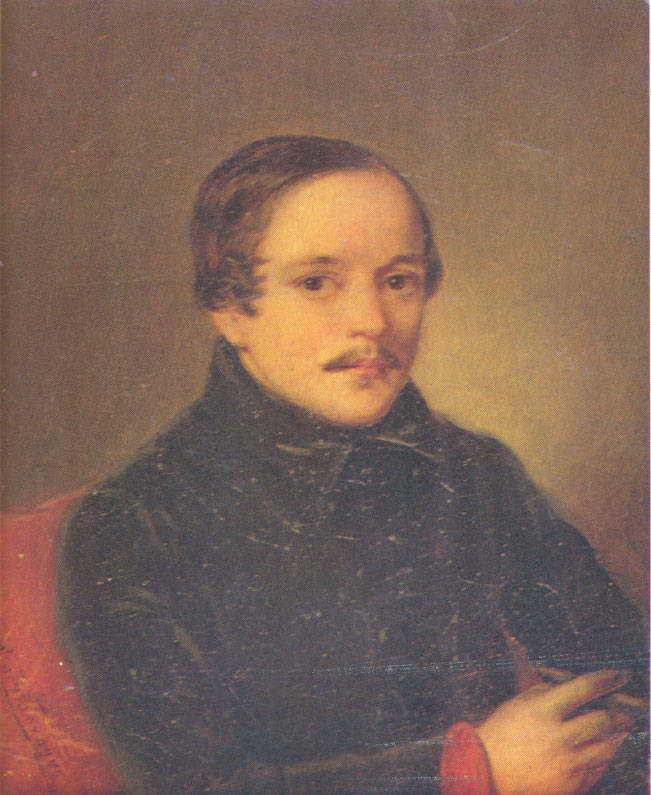
M. Yu. Lermontov in 1840 year
The duel passed behind the Black River. In an explanation to the regimental commander, Lermontov wrote: “Since Mr. Barant considered himself offended, the choice weapons I provided him. He chose swords, however there were pistols with us. As soon as we managed to cross the swords, as my end broke ... Then we took the pistols. They should have been shooting together, but I was late. He missed, and I shot to the side. After that, he gave me a hand, and then we parted ways. ” The decisions of Nicholas I, Mikhail Yuryevich, waited while sitting under arrest. Contrary to universal expectations, the emperor treated Lermontov extremely severely, sending him to the Caucasus in the Tenginsky infantry regiment. It should be noted here that Nicholas I, wishing to leave a good memory of himself, very carefully followed all dissident writers. Mikhail Yurevich came into his field of view immediately after the appearance of “The Poet's Death”. According to the memoirs of contemporaries, the emperor, after reading the verses, said annoyedly: "This is not even an hour, will replace Pushkin's country." By 1840, Lermontov, who had already mastered the minds of the reading public, became for Nicholas I a source of hidden threats and constant irritation. When there was a reason to send the poet out of sight, the king realized that the best solution was to ensure that Mikhail Yuryevich never returned from exile.
Just before sending (in May 1840) the poet spent two weeks in Moscow. He waited for the release of the first edition of The Hero of Our Time, participated in Gogol's wires abroad, in which, at the request of those present, he read an excerpt from Mtsyri. To some extent, Lermontov was pleased with his Caucasian exile, the change of scenery only spurred his creative genius. But the commander of the troops on the Caucasian line, General Pavel Grabbe grabbed his head. Being a highly educated man who closely followed Russian literature, he understood perfectly well what place he already occupied and what the exiled lieutenant could take in the future. In violation of the royal decree, Grabbe did not send the poet to the forefront of the infantry, but seconded General Apollo Galafeev to the cavalry detachment. His people were based in the fortress of Grozny and made forays along the left flank of the Caucasian line. The chances of surviving here were much greater.
Summer for Lermontov turned out to be hot and not only because of the hot weather - Galafeev's subordinates constantly engaged in a fierce skirmish with the Chechens. In mid-July, an assault on enemy blockages occurred, later described in the “Journal of hostilities”, on the Valerik River. An unknown chronicler reported that Mikhail Yuryevich, with "excellent courage and composure", watched the actions of the front column, "notified the chief of the successes," and then "with the first bravest broke into the enemy obstructions." In carrying out the assignment, the poet had to ply through the forest, in which an enemy could hide behind every tree. The very next day, Lermontov shifted the picture of the battle onto paper, so the famous "Valerik" was born.
Throughout August, Mikhail Yurievich rested on the waters, and at the beginning of autumn he returned to the army in the field. Soon he was put in charge of a detachment of hundreds of Cossacks. Almost immediately, Lermontov earned the respect of his subordinates - he demonstrated an excellent knowledge of military affairs, shared with ordinary soldiers all the burdens of everyday life (to the extent that he ate with them from one boiler) and rushed to the enemy first. The “ardent courage”, courage and quickness of the poet drew the attention of the command. In the award list, in particular, it was stated: "It is impossible to make a better choice - everywhere Lieutenant Lermontov, everywhere the first was subjected to shots and at the head of the detachment dedication rendered above all praise." For the encouragement of Lermontov, Grabbe himself and Prince Golitsyn, the commander of the cavalry, petitioned. In response, they received only the monarch's reprimand for daring to arbitrarily “use” the poet in the cavalry detachment.
At this time, Arsenieva was doing everything possible to get her grandson out of the Caucasus. However, all that she has achieved is that Lermontov’s vacation was paid off. In February, 1841 Mikhail Yuryevich arrived in St. Petersburg, where he stayed until May. On the way back he went with a heavy heart, the poet was tormented by bad forebodings. On the road from Stavropol to the Dagestan fortress Temir-Khan-Shura Lermontov and his faithful companion Stolypin-Mongo got stuck because of the rain at one station. Here friends decided to call in the resort Pyatigorsk. Later, upon arrival at the site, Lermontov and Stolypin obtained fictitious conclusions regarding the need for water treatment - under certain conditions, the military doctors were going to meet the officers. The main secular point in Pyatigorsk was the house of General Versilin. It was in 1841 in mid-July that the quarrel between Mikhail Yuryevich and Nikolai Martynov, a friend of the poet from the time of the school, occurred.
Lermontov spent the last hours at her cousin Ekaterina Bykhovets, who knew nothing about the upcoming fight. In parting, he kissed her hand and said: "Cousine, there will be no happier hours in this life." At the seventh o'clock in the evening of July 15 at the foot of Mount Mashuk a duel was held. Following the team "converge" the poet froze in place, turning his right side to the enemy, closing his hand and raising his weapon up. Martynov, on the contrary, taking aim, quickly went to the barrier. He pulled the trigger, and Lermontov "fell down" fell to the ground. At that moment, according to legend, thunder struck, and a terrible thunderstorm began.
The full truth about this ridiculous duel, most likely, no one will ever know. The inconsistencies are already visible at the time of the poet's call. According to the official version, the duel provoked Lermontov’s joke, who called Martynov in the presence of the ladies a “highlander with a huge dagger”. However, on such trifling occasions nobles, as a rule, did not shoot. According to another version, in Pyatigorsk, Mikhail Yuryevich became interested in Emilia Verzilina, but she preferred Martynov to him. Stung poet brought down on the opponent a hail of jokes, epigrams and caricatures. It should be noted that Martynov, a vain and arrogant man, was in a state of extreme depression that summer, as he was forced to resign a few months before, having been caught on a card cheat. The duel itself abounds in solid “white spots”. The fight was organized against all the rules, in particular, there was no doctor and crew on the spot. At the same time, with the filing of Martynov, the conditions of the duel were the most severe - they were shot at a distance of fifteen steps from powerful pistols to three attempts! The official seconds were Prince Alexander Vasilchikov and the cornet Mikhail Glebov, but there is every reason to suspect the presence of Stolypin-Mongo and Sergey Trubetskoy, whose names were mutually persuaded from investigators because they were already exiled in the Caucasus. And most importantly - Lermontov, according to contemporaries, was a great shooter, able to "put a bullet on the bullet." On the eve of the duel, he publicly stated that he would not shoot at Martynov. At the duel, Mikhail Yuryevich repeated: "I will not shoot at this fool." And supposedly shot in the air. In this light, Martynov killed a defenseless man. In the court opinion it was stated that a bullet had pierced the right lung, and the poet died instantly. However, according to the testimony of the servant of Lermontov, "during transport, Mikhail Yurevich was moaning ... he stopped moaning halfway and died calmly." But it was transported to Pyatigorsk four hours after the duel. Nobody believed in the tragic outcome of the duel in the city, the officers bought champagne, set a festive table. There were also no people interested in an objective investigation - one of the seconds of the duel was the son of the favorite of Tsar Illarion Vasilchikov, and the matter was urgently needed to be hushed up. Possible witnesses — Sergey Trubetskoy and Stolypin-Mongo — took all the secrets with them to the grave, and Martynov's associates subsequently spent a lot of energy in order to rehabilitate themselves in the eyes of the descendants.
At the funeral of Mikhail Yurevich gathered almost the entire city. Only nine months later, Arsenyeva was allowed to transport the grandson’s ashes home. The great poet found a last refuge in the Tarkhany family chapel. Elizaveta Alekseevna survived him by only four years.
Lermontov's life was cut short at the moment when the star shone with his bright light on the horizon of Russian literature - titanic abilities and great talent combined with purposefulness and creative will promised to give the Fatherland a genius, whom she had not yet known. In memory of the great poet, little remained until the offensive, in the heyday he wrote only about seventy poems, a number of poems and one novel (Mikhail Yuryevich’s total creative heritage was four hundred poems, 5 dramas, 7 tales, 25 poems, about 450 drawings in pencil and pen, 51 watercolor and 13 works in oil). The philosopher Vasily Rozanov stated in his writings: “Lermontov rose an immeasurably stronger bird than Pushkin. Nobody else in the domestic literature has had such a tone ... ”In light of this, the words of Leo Tolstoy seem not such an exaggeration, that“ if this boy remained alive, neither Dostoevsky nor I would be needed ”.
According to the materials of the site http://www.mlermontov.ru/ and the weekly edition “Our history. 100 Great Names »
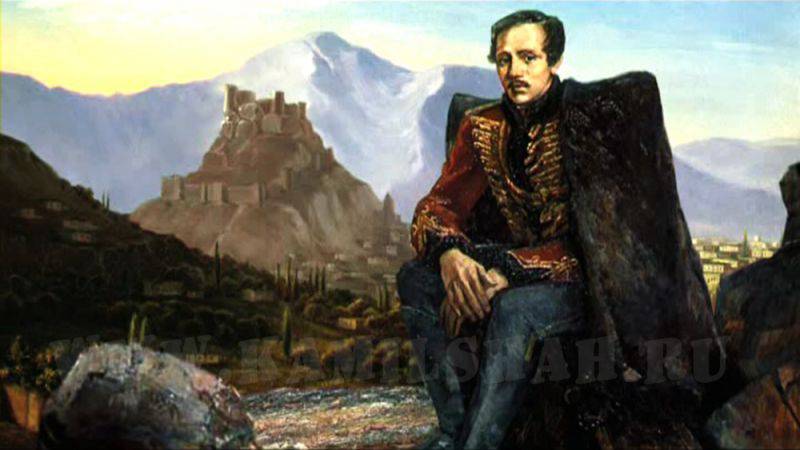
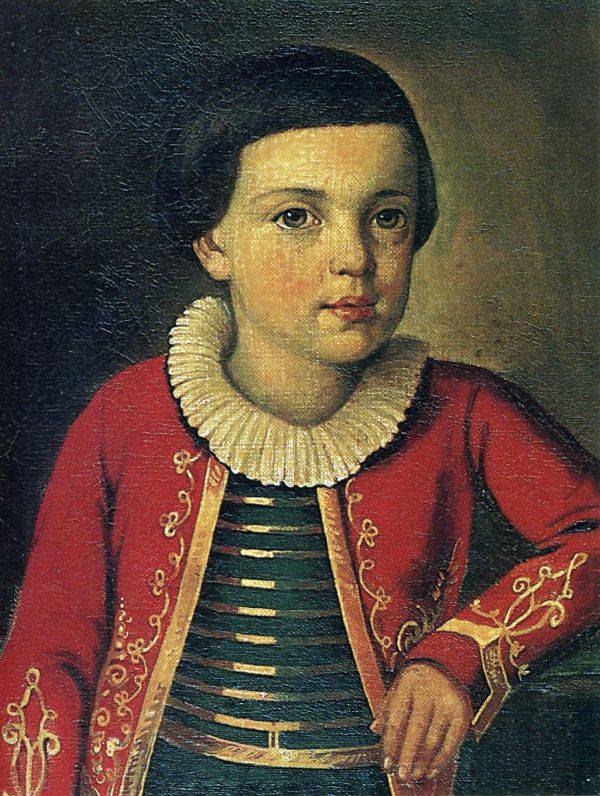
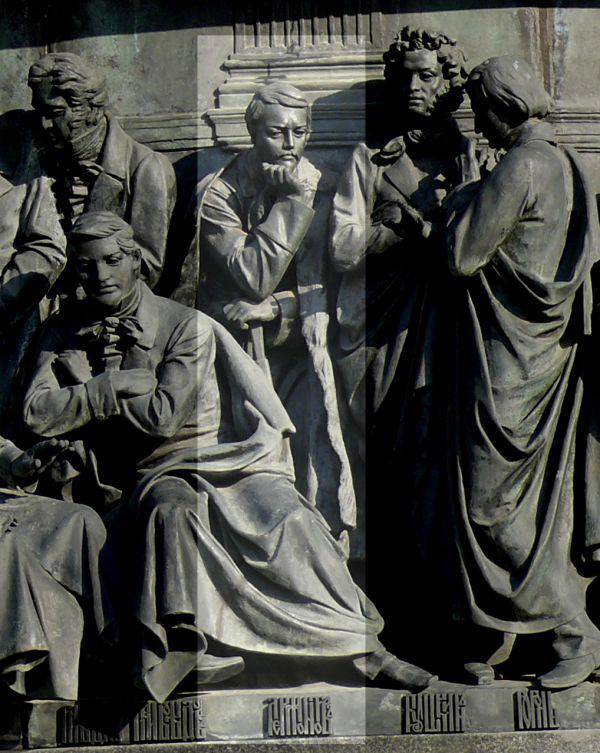
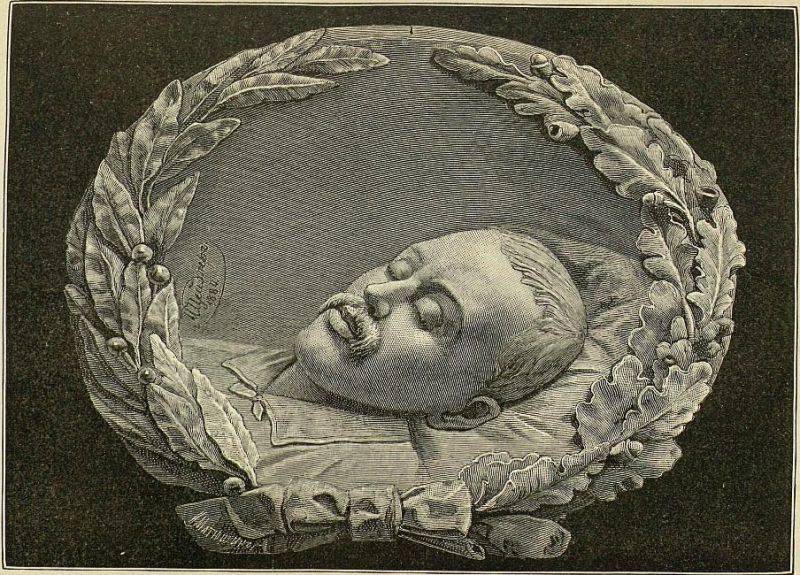
Information